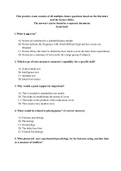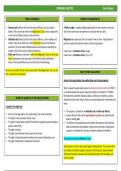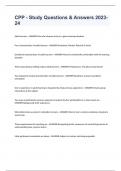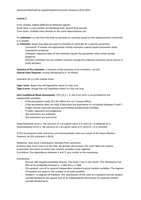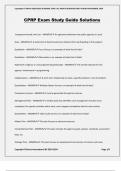Act 1, Scene 1
➢ Kent & Gloucester are discussing the division of the Kingdom
○ Would shock Jacobean audience as James 1st wanted to
unite England & Scotland, unification was important to them
○ “Divided in 3 our kingdom”
○ “To shake all cares and business from our age, conferring
them on younger strengths while we unburdened crawl
towards death”
○ Wants to divide “that future strife may be prevented”
○ Theme of old age & youth introduced
➢ Patriarchal society noticed from outset of play - K&G talk of the
Kings Sons-in-law (Albany and Cornwall), rather than his
daughters
➢ King impulsively decides on the love test - originally planned to
divide Kingdom equally but impulsively decides in front of the
court to have the test
➢ Gloucester mocks the birth of his illegitimate son
○ Introduces subplot - no subplots in greek tragedy,
Shakespeare introduces them to literature
○ Theme of fatherhood introduced
➢ Gloucester - garrulous (talks too much) & bawdy
➢ Kent - opposite to gloucester, taciturn (polite & talks little)
➢ Edmond - when he is introduced seems polite at first but in reality
is evil
○ Theme of hiding evil/personality change introduced
➢ Setting - State room, opulent, lavish
➢ Play contains standard hierarchy order which would have pleased
a jacobean audience
➢ King - peremptory (demanding)
➢ “We shall express our darker purpose”
○ Lear telling everyone his plan
○ “We” = i
○ Ominous adjective used to foreshadow the sinister plan to
come
○ Wants to keep his title but pass on his duties
○ He is the arbiter of the love test (referee)
➢ “Which of you shall we say doth love us most”
➢ Goneril's speech:
○ Full of flattery, hyperbole, insincerity
○ “Sir” - formal, detached
, ○ “Words can wield” - alliteration highlights irony
○ “Valued, rich or rare” - portrays her true motive
○ Repeats “i love you” at the end - manipulative
➢ Reagan's speech:
○ “Self mettle that my sister is” - immediately creates tension
between R&G
○ Repetition of personal pronouns “my” & “i” show she is self
centred
○ “In your dear highness’ love” - lack of real emotion & repeats
love to be manipulative
➢ Cordelia's speech:
○ Asides show her anguish and worry
○ “What shall Cordelia speak? Love and be silent”
○ “My loves more richer than my tongue” - has genuine love for
her father, cant express love in words
○ “Nothing, my lord” abrupt, possible self sabotage
○ “I love your majesty according to my bond” - loves him as
much as expected with a father/daughter relationship
○ “Why have my sisters husbands if they say they love you all?”
- tries to point out her sisters over emphasis
○ Lear offended at this - shown through his monosyllabic
language
○ Personification of honesty
○ Has her fathers pride in her - she wont go against her
beliefs
➢ Lear disowning Cordelia:
○ “Here i disclaim all my paternal care” uses personal pronoun
“I” instead of royal “we” this change in tone shows that he has
been angered
○ “Dragon and his wrath” - vivid violent imagery
○ “Let pride, which she calls plainness, marry her” he identifies
his own fatal flaw (pride) and attributes it to Cordelia
➢ Kents reaction:
○ Kent uses fricatives and consonants to emphasise the Kings
madness -“falls to folly” folly means mad
○ “See better lear” - another eyesight reference, ironic
○ “I'll tell thee thou dost evil” - blunt and monosyllabic
language
○ Personification of loyalty
○ Use of rhyming couplets give a sense of finality as he is
about to be banished
➢ Frances reaction:
○ Refers to cordelia as his “best object” and the “most best,
most dearest” - superlatives
○ Refers to Cordelia as a “dowry”
, ○ Rhetorical question shows his shock and is a plot device
used to defend Cordelia
➢ Cordelia's reaction:
○ Is she a passive character? She does not put up a fight
when he banishes her. JB audience would have thought this
as in keeping with their societal norms
○ “If for i want that glib and oily art” - spirited subtle reference
to the vice of her sisters ability to flatter and deceive
○ If she was once passive, she is not passive anymore, she is
direct, honest and prophetic
○ Refers to her fathers “washed eyes” - she has saw her sisters
true intentions / she is crying due to her heartbreak of
leaving her father
○ “I know what you are” - monosyllabic words are chilling
○ “Love well our father” - still cares about him and doesn't
trust them to care for him
○ “Time shall unfold what plighted cunning hides”
➢ Goneril & regans reactions:
○ Shakespeare changes to prose, usually writes in blank verse
& Only uses prose when he is writing about servants talking
or an intimate conversation
○ “You see how full of change his age is...he always loved our
sister most”
○ “Poor judgement” is a result of the “infirmity of his age”
○ “The best and soundest of his time hath been but rash”
○ “Lets hit together” - ominous, reveals true intentions
○ Goneril seems to take the lead, she is the more dominant
sister
Characters:
➢ Kent - taciturn (polite & talks little)
, ➢ Gloucester - garrulous (talks too much) & bawdy
➢ Edmund - polite at first but underneath is evil
➢ King Lear - peremptory (demanding), impulsive
➢ Goneril - evil sister
➢ Cordelia - good sister & Lears favourite
➢ Regan - evil sister
➢ Albany and Cornwall - daughters husbands
Quotes:
➢ “Divided in 3 our kingdom”
➢ “To shake all cares and business from our age, conferring them
on younger strengths while we unburdened crawl towards death”
➢ “that future strife may be prevented”
➢ “We shall express our darker purpose”
➢ “Which of you shall we say doth love us most”
➢ “Sir, i do love you more than words can wield”
➢ “Love, and be silent”
➢ “My loves more ponderous than my tongue”
➢ Les you may mar your fortunes”
➢ “Here i disclaim all my paternal care”
➢ “Dragon and his wrath”
➢ “Let pride, which she calls plainness, marry her”
➢ “falls to folly”
➢ “See better lear”
➢ “I'll tell thee thou dost evil”
➢ “best object” “most best, most dearest” “Dowry”
➢ “If for i want that glib and oily art”
➢ “washed eyes”
➢ “I know what you are”
➢ “Love well our father”
➢ “Time shall unfold what plighted cunning hides”
➢ “Full of change his age is”
➢ “He always loved our sister most”
➢ “Poor judgement”
➢ “The best and soundest of his time hath been but rash”
➢ “Lets hit together”
Themes introduced:
➢ Old age & youth
➢ fatherhood
➢ Hiding evil
Act 1, scene 2




